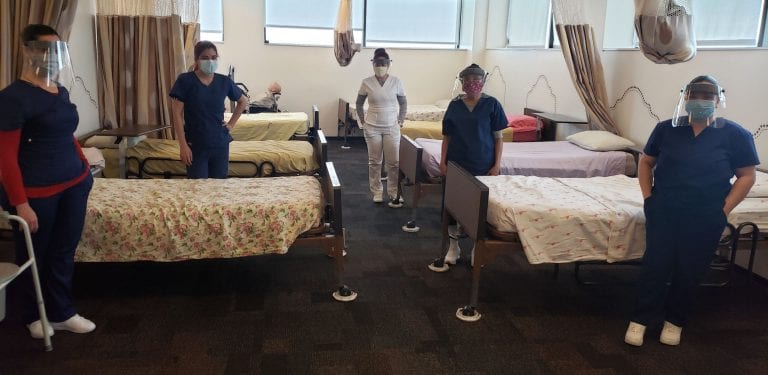NYCETC’s Member Spotlight series – which introduces our readers to the wide variety of workforce programs and services that our members offer across the five boroughs – is shifting to highlight the ways in which organizations have shifted their services to best support their clients and communities during the COVID pandemic and within the post-COVID economy. This week we focus on Cooperative Home Care Associates (CHCA).
Trainees in CHCA’s Certified Home Health Aide and Personal Care Assistant program, which has incorporated a COVID-19 module, increased PPE use, and social distancing guidelines for healthcare professionals.
Cooperative Home Care Associates (CHCA) is a nationally recognized, worker-owned home care agency in the Bronx. As one of the largest worker-owned cooperatives in the country, CHCA is made up of over 2000 worker-owner home health aides (HHAs) and trains over 600 low-income individuals every year to provide home care services to New Yorkers who are elderly, chronically ill, or living with disabilities in their communities. CHCA offers free, four-week HHA training in both English and Spanish. Graduates of the training program receive dual certification as a Certified Home Health Aide and Personal Care Assistant, with guaranteed employment through CHCA. Despite the current dangers of working within a healthcare environment, demand for this program has remained as high as it was prior to the pandemic.
Sitting at the nexus of healthcare, vocational training and an innovative business and employment model, CHCA’s operations have been deeply impacted by the COVID pandemic and the organization’s efforts to support increased needs among clients and staff. In response to the pandemic, CHCA has implemented deep cuts in the number of trainees per class, added a COVID-19 training module, and increased PPE for trainees and staff. To help address increased food insecurities in the community, CHCA has become an authorized enroller for the NYC GetFood Program, enrolling and re-enrolling over 50 members and referring numerous home care workers to food pickup locations.
As a training program which leads to employment with the company itself, the initial statewide pause and subsequent transition to a virtual setting has significantly diminished its incoming workforce. When training resumed in late May, it was done so with a great reduction in the amount of trainees to maintain social-distancing guidelines in the classroom: now down to 10 trainees per class in comparison to 3 classes with 20 trainees running concurrently prior to the pandemic. Similarly, the transition to a virtual setting has limited CHCA’s Open House Information sessions to 10 candidates per session. This is compounded by the limited Internet access and technology skills of older limited-English speaking candidates, who are one of the organization’s highest recruited populations. While all organizations are facing challenges and increased costs in procuring PPE for trainees and staff, these have been particularly challenging to the company’s bottom line due to the volume of PPE needed, the inability to reimburse these costs, and the fact that as a worker-owned company CHCA distributes profits with all of its worker owners. While CHCA has been able to connect to other worker-cooperatives such as Opportunity Threads to procure washable masks for its HHAs, this challenge will remain throughout the pandemic.
The increased preparation and focus on safety and guidelines has been critical to CHCA’s workers and clients, given the fact that the pandemic has had especially devastating consequences for older and immuno-compromised individuals. “My job remains the same, but I worry every day about getting infected [with COVID-19], and especially about bringing the virus into my client’s home,” said Ricardo Araujo, an HHA at CHCA for the last three years. “What has changed is that I now take extra precautions as soon as I step outside my house, when I’m on the subway and when I’m in my client’s home. He is a very nice older man who lives with his wife. If they’re worried about catching anything from me, they don’t talk about it, at least not with me. Regardless, I wouldn’t want anyone bringing a virus into my home with my family, so I do everything I can to prevent myself from doing that to them.” Read more about Ricardo and the HHA experience in the midst of the pandemic here.


